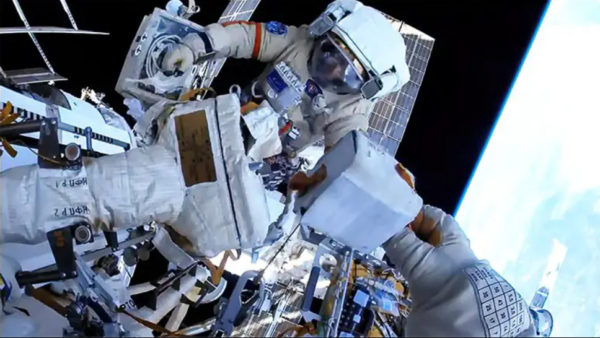On Wednesday, April 19, four Expedition 69 astronauts conducted the majority of their scientific investigations aboard the International Space Station (ISS), focusing primarily on human research and fluid physics. Following an overnight spacewalk to relocate and install hardware, the three cosmonauts onboard the orbital outpost slept in.
The latest space biology experiment taking place on the station investigates how long-term weightlessness affects the vision and brain of astronauts. Blood and cerebrospinal fluid shift toward the cranium due to the absence of gravity, causing ocular and cranial pressure.

The International Space Station’s Expedition 69 astronauts performed experiments.
NASA astronauts Stephen Bowen and Woody Hoburg collected their blood pressure measurements and scanned their chests with the Ultrasound 2 device for the ISAFE investigation on Wednesday morning as they studied this phenomenon and methods to mitigate the space-induced symptoms.
Afterward, Bowen examined biological samples within the Confocal Microscope using fluorescence imaging techniques to evaluate its functionality. Hoburg assisted UAE (United Arab Emirates) Flight Engineer Sultan Alneyadi in installing equipment to initiate the CapiSorb Visible Systems fluid physics investigation.
This experiment examines the possibility of using a liquid-based carbon dioxide removal system to promote more efficient space-based solutions and advanced Earth-based applications.
NASA astronauts examined how weightlessness affected their eyes and brains.
In addition, the three astronauts and NASA Flight Engineer Frank Rubio spent a portion of Wednesday afternoon reviewing procedures and rehearsing robotic maneuvers in preparation for an April 28 spacewalk.
Bowen and Alneyadi are scheduled to spend approximately six and a half hours in the vacuum of space overhauling the power generation system of the orbital outpost. Monday at 2:00 p.m. EDT, managers of the space station will discuss the impending spacewalk live on the NASA TV app and the agency’s website.
Commander Sergey Prokopyev and Flight Engineer Dmitry Petelin completed the third spacewalk of the year overnight after installing a radiator on the Nauka scientific module. The two astronauts concluded the seven-hour and 55-minute logistics spacewalk at 5:35 a.m. on Wednesday, with assistance from Roscosmos Flight Engineer Andrey Fedyaev, who operated the European robotic arm (ERA) while holding the radiator.
Before resuming their regular duty on Thursday, the Roscosmos crew will have a lengthy rest period. The following day, Prokopyev and Petelin will sanitize their Orlan spacesuits and store their spacewalking equipment in the Poisk module. Fedyaev will return the ERA to its storage location on the Nauka before shutting it down.

